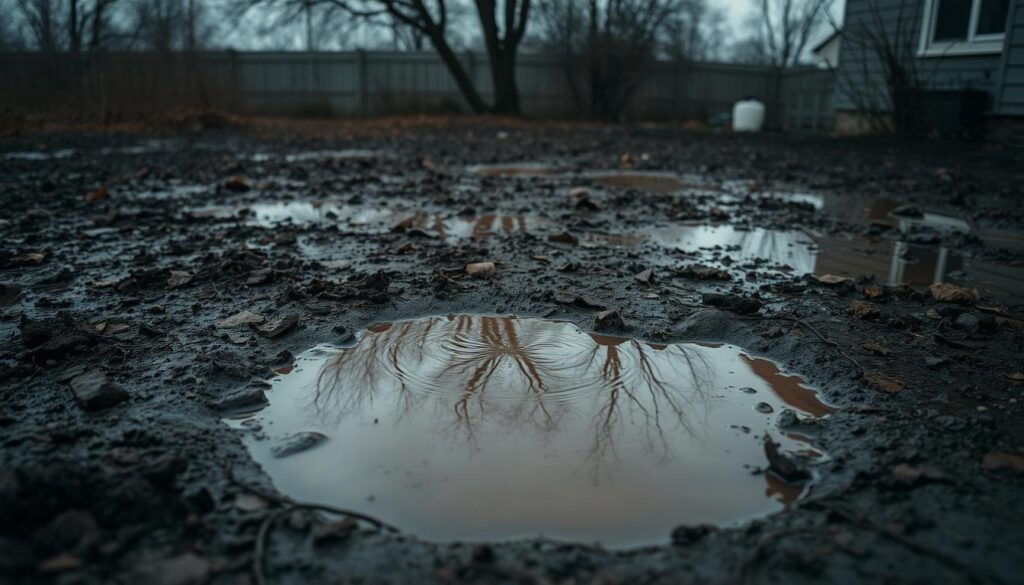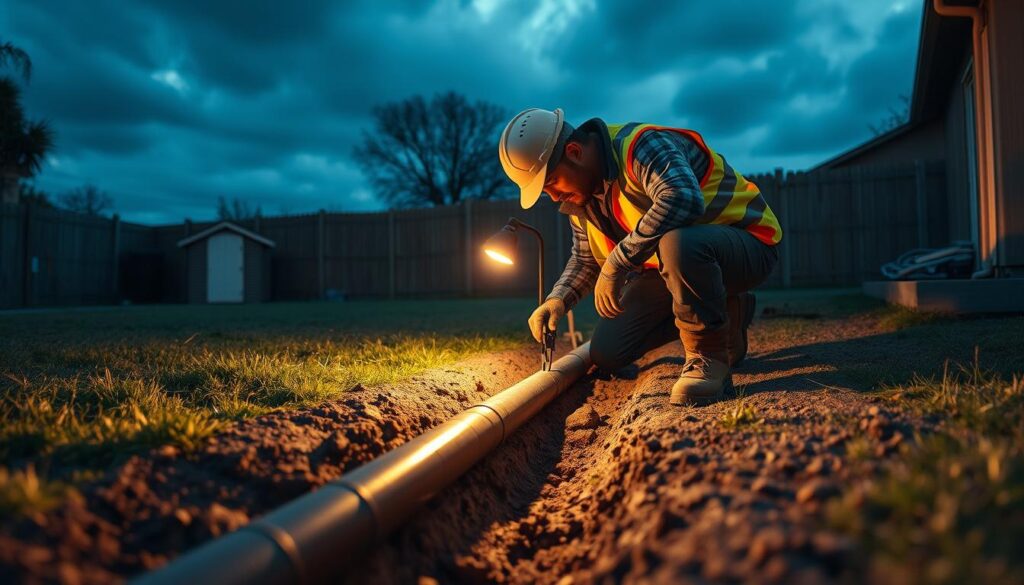We know finding raw sewage in the yard is alarming, so our first priority is safety and quick action.
Act immediately: keep people and pets away, limit indoor water use and call for help. Common causes include blockages from debris, tree roots, broken pipes or heavy rain that overloads the network. These problems can spread bacteria and viruses, creating a real health risk if left unchecked.
We outline simple early steps you can take while waiting for professionals. Cordon off the area, wear gloves and avoid contact with contaminated water. Hard surfaces can be disinfected with a bleach solution, but contaminated soil or complex pipe faults usually need expert diagnostics like CCTV inspection and high‑pressure jetting.
For fast, 24/7 response across Melbourne, OnCall Emergency Plumbers are available to contain the issue and arrange lasting repairs. Call us any time on 1800 571 216 for urgent help.
Key takeaways
- Act fast: isolate the area and limit water use to reduce spread of contamination.
- Raw sewage can carry harmful bacteria; protect people and pets immediately.
- Hard surfaces can be disinfected; soil contamination often needs specialists.
- Professional diagnostics (CCTV, jetting) find root causes and guide repairs.
- Private faults are owner responsibility; report broader network issues to council or health authorities.
- We offer 24/7 emergency response in Melbourne—call 1800 571 216 for prompt assistance.
Understanding the risks of a sewer overflow in your yard
Raw sewage on your property creates immediate hazards that need quick, careful attention.
Significant health hazards from raw sewage exposure
Contact with contaminated waste can cause gastrointestinal illness, skin infections and other significant health hazards.
We advise keeping children and pets away and wearing protective gear. Vulnerable people with chronic health conditions face higher risk and must avoid the affected area.
Environmental and property impacts to consider
Sewage can soak into soil and hard surfaces, create odours and attract pests. Polluted runoff after rain may spread contaminants into drains and the broader system.
- Common triggers: blockages, tree root intrusion, damaged pipes and storm surge issues.
- Document the scene with photos before cleanup for insurance and repair planning.
- Limit indoor water use to slow spread while we mobilise our 24/7 Melbourne team.
| Hazard | Impact | Immediate action |
|---|---|---|
| Pathogens in sewage | Illness, infections | Isolate area, PPE, call us |
| Soil contamination | Plant loss, odour | Containment, professional remediation |
| System overload | Neighbouring spills | Reduce water use, inspection |
OnCall Emergency Plumbers operate 24/7 across Melbourne with experienced crews, trusted materials and affordable solutions. Call 1800 571 216 for urgent assistance.
Sewer overflow yard: what to do immediately and what to avoid
Immediate containment and clear safety steps cut the risk after a raw sewage event. Start with simple actions that protect people and property while we arrange professional help.

Cordon off the affected area and use protective gear
First, mark and isolate the affected area. Keep children and pets well away.
Wear rubber gloves, waterproof boots and a mask if you must approach. Avoid walking contaminated water into clean parts of the property.
Save water inside the home to prevent further overflow
Pause laundry, dishwashers and non‑essential flushing. Reducing water use slows further ingress and helps contain the issue.
Who to contact first: council or health department versus private property issues
If multiple properties are hit or the incident reaches public spaces, contact the local council or health department for public health guidance.
If the spill is confined to your home, arrange a licensed specialist. Do not bury waste or use garden lime without official advice.
When to call OnCall Emergency Plumbers on 1800 571 216
Call us immediately if you see sewage on site, if toilets or floor drains back up, or if you smell persistent sewage indoors.
For urgent response in Melbourne, call OnCall Emergency Plumbers 24/7 on 1800 571 216. Our plumbers arrive prepared to stabilise the area, liaise with authorities when needed, and begin assessment for lasting repairs.
| Immediate issue | Recommended action | Who to contact |
|---|---|---|
| Raw sewage visible on property | Isolate area, PPE, limit water use | Licensed plumber (call 1800 571 216) |
| Multiple properties affected | Report to council, follow health guidance | Local council / health department |
| Indoor backup or strong odour | Stop non‑essential water, ventilate safely | OnCall Emergency Plumbers |
Diagnosing the cause and planning cleanup steps
Pinpointing the source of contamination is the first step in a safe, effective response. We carry out targeted inspections to find where the line or pipe is failing and to plan the right cleanup steps.

Common causes we check
- Blockages from debris and toilet paper in the sewer line.
- Tree roots invading joints and cracking sewer pipes.
- Age‑related breaks, collapsed sections or storm surcharge on the system.
How we identify the source
We inspect inspection shafts and overflow relief gullies and look for local wet patches or strong odours that show where sewage is coming from.
Our plumber team uses pressure and flow tests to confirm if the issue is on private property or in shared sewer lines.
Safe cleanup basics and professional methods
- Remove solids safely, bag them and disinfect hard surfaces following health department guidance.
- Contaminated soil often needs controlled removal; do not hose waste into storm drains.
- We use CCTV to map defects, and high‑pressure water jetting to clear deposits and roots.
| Step | Purpose | Outcome |
|---|---|---|
| CCTV inspection | Locate faults in the line | Accurate plan for necessary repairs |
| Jetting | Clear blockages without damage | Restore flow and reduce repeat issues |
| Targeted repair | Replace or rehabilitate failed pipe sections | Long‑term service restored |
OnCall Emergency Plumbers provide rapid diagnostics and remediation across Melbourne. Call us 24/7 on 1800 571 216 for CCTV, jetting and affordable, quality fixes to prevent a repeat sewage spill.
Preventing future sewage overflows at home
Small daily habits can keep your drains clear and reduce the chance of a costly sewage incident. We recommend a simple, proactive plan that protects sewer lines, pipes and the wider system.
Smart flushing and drain habits to protect your sewer system
Only flush human waste and toilet paper. Keep fats, oils, wipes and sanitary items out of any line.
Use strainers in sinks and remove debris regularly to stop build‑ups that cause blockages.
Tree root management and pipe condition monitoring
Choose garden species with less aggressive roots and keep trees away from known pipe runs. Root barriers help reduce tree roots reaching joints.
Book periodic CCTV checks so we can spot deformation, offsets or early root entry before larger problems form.
Maintenance plans, backflow prevention, and overflow relief solutions
- Annual jet cleaning removes scale and debris to keep lines flowing during peak water use.
- Install backflow devices and relief points to protect interiors if the system becomes surcharged.
- Monitor odour and damp spots and report small issues early to avoid emergency repairs.
Why partner with OnCall Emergency Plumbers
We provide scheduled inspections, jetting and brand‑backed parts so sewer pipes stay durable. For proactive care and rapid response across Melbourne call 1800 571 216.
Conclusion
Prompt, practical action limits harm and reduces the time and cost needed to fix sewage problems at home. Isolate the area, keep people and pets clear, and cut non‑essential water use until we arrive.
If multiple properties are affected, contact the council or health department so public risks are managed. For private issues we attend quickly, diagnose along the line and inspect sewer pipes to plan necessary repairs.
Hard surfaces need methodical cleaning; contaminated soil often needs specialist removal. Targeted fixes — clearing debris, repairing a damaged pipe and treating root entry — give lasting results and reduce repeat problems.
We provide a clear plan, timeline and report. For fast, affordable help in Melbourne call us 24/7 on 1800 571 216 or visit https://oncallemergencyplumbers.com.au/. With the right steps and support you can fix sewage impacts swiftly and keep the yard safe.
FAQ
What health risks arise when raw sewage contaminates our garden?
Raw sewage contains bacteria, viruses and parasites that can cause gastroenteritis, skin infections and respiratory issues. We should avoid contact, keep children and pets away and wash any exposed skin immediately. For significant contamination, contact the local health department for specific testing and medical advice.
How quickly should we cordon off the affected area and what protective gear is recommended?
We should isolate the site straight away to limit exposure. Use gloves, waterproof boots and eye protection before approaching. If cleaning is required, wear a disposable mask or respirator rated for biological hazards and change contaminated clothing promptly.
Is it important to reduce water use inside the home after a spill?
Yes. Conserving water reduces pressure on the drainage system and helps prevent further discharge. We recommend avoiding laundry, dishwashers and multiple simultaneous toilet flushes until a plumber has inspected the line.
Who should we contact first — council, health department or a private plumber?
For public-system incidents affecting multiple properties, contact your local council or state health department. For issues confined to your property, call a licensed plumber. If there are immediate health threats or widespread service disruption, notify both authorities and an emergency plumbing service.
When should we call OnCall Emergency Plumbers on 1800 571 216?
Contact OnCall immediately for persistent backups, visible pipe damage, raw sewage on your property or when blockage removal is urgent. We provide rapid response, site assessment and emergency repairs to reduce health risks and property harm.
What are the most common causes of blockages and line failures?
Frequent causes include tree roots infiltrating pipes, grease and fat buildup, non-flushable items such as wipes and sanitary products, collapsed or aged pipes and heavy stormwater runoff. Regular inspections help detect problems early.
How can we identify the source of a discharge or leak on our property?
Look for inspection shafts, overflow relief gullies, wet patches, unusual odours and persistently damp grass. A CCTV pipe inspection provides a definitive diagnosis by showing blockages, root intrusion or structural faults.
What are safe cleanup steps for hard surfaces and soil?
For paved areas, remove solid debris with a shovel, disinfect surfaces with a recommended biocide and rinse with clean water while preventing runoff to storm drains. For contaminated soil, removal and replacement is often required — follow health department guidance and use licensed contractors for disposal.
What professional methods do plumbers use to fix the problem?
We use CCTV inspections to locate faults, high-pressure water jetting to clear blockages, mechanical rodding for root clearance and trenchless relining or pipe replacement for damaged sections. Repairs are chosen based on condition, cost and longevity.
How can we prevent future incidents at our home?
Adopt good flushing habits (only water and toilet paper), avoid pouring grease down drains, schedule routine plumbing inspections and arrange root management near aging pipes. Installing backflow prevention and overflow relief devices adds extra protection.
How should we manage tree roots near underground pipes?
Regularly inspect root-prone areas and trim or remove trees with invasive roots. Use root barriers and consider relining pipes to resist future intrusion. Engage an arborist and a licensed plumber to plan safe root management.
What maintenance plans or devices reduce the risk of recurrence?
Regular drain cleaning, CCTV pipe surveys, scheduled jetting and a tailored maintenance plan reduce risk. Consider backflow prevention valves, overflow relief gullies and upgrading old pipes to modern materials for long-term reliability.
Why should we choose an experienced emergency plumbing team and trusted brands?
Experienced teams deliver faster diagnoses, safer cleanup and durable repairs. Quality parts and proven techniques minimise repeat incidents and overall cost. We prioritise accredited tradespeople and reputable materials to protect health and property.
